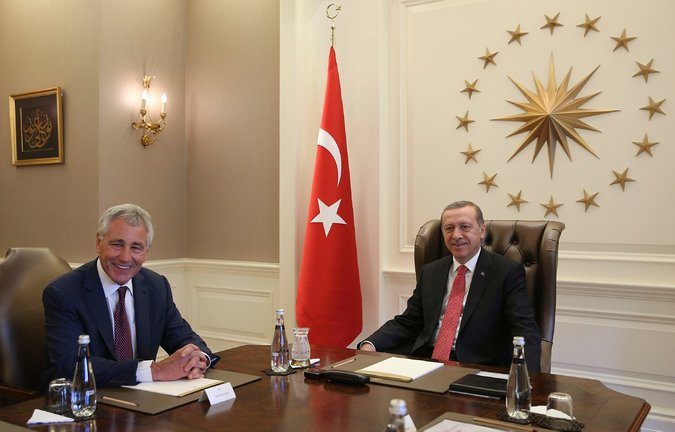ANKARA, Turkey — The Obama administration on Monday began the work of trying to determine exactly what roles the members of its fledgling coalition of countries to fight the Islamic State in Iraq and Syria will play, with Defense Secretary Chuck Hagel huddled with the leaders of the one country the administration has called “absolutely indispensable” to the fight: Turkey.

But after hours of meetings here, there were no announcements of what the government of President Recep Tayyip Erdogan might do. In fact, Turkish officials meeting with Mr. Hagel eschewed the news conferences that usually accompany high-level visits from American officials.
Rather, Turkey’s foreign minister, Mevlut Cavusoglu, warned on the state-run Anatolia news agency that weapons sent by Western countries to fight ISIS could end up in the hands of the Kurdistan Workers’ Party, or P.K.K., which Ankara considers a terrorist group.
“We have expressed our concerns,” Mr. Cavusoglu said. “It may not be possible to control where these weapons will go.”
Turkish officials raised concern about a host of issues surrounding the coalition, including the safety of 49 Turkish diplomats who have been taken hostage by ISIS, and whether the growing international effort to arm Kurdish fighters in Iraq against ISIS could embolden Kurdish militants in Turkey who have been seeking autonomy for the country’s largely Kurdish southeast. Turkish Kurds with the P.K.K. have fought with Kurdish pesh merga fighters in northern Iraq against ISIS. Turkey is also grappling with an influx of more than 800,000 Syrian refugees — the largest Syrian refugee population after Lebanon’s.
Speaking to reporters after meeting with Mr. Erdogan on Monday, Mr. Hagel said that Turkish officials had expressed to him their concern about the P.K.K. But, he added, “They didn’t indicate to me in any way that they saw the P.K.K. as a more significant threat than ISIL,” using an alternative acronym for ISIS.
The Obama administration wants Turkey to crack down on the flow of foreign fighters who have used the country as a transit point to Syria to join militant groups fighting there. The United States also wants to be able to use Turkish military bases to begin operations, including airstrikes, on ISIS targets in Iraq and Syria if President Obamadecides to attack inside Syria.
“By geography, Turkey is going to be absolutely indispensable to the ongoing fight against ISIS,” a senior defense official said, speaking on condition of anonymity. “Because of just where they sit, the access we currently already have militarily and the cooperation we have militarily.”
Mr. Erdogan, at the NATO summit meeting in Wales last week, met with Mr. Obama and said Turkey would become the only majority Muslim country so far to join what Mr. Hagel termed a “core coalition” of 10 countries fighting ISIS. Mr. Obama said after the meeting that he would welcome Turkey’s participation in his coalition.
But Turkey has several times balked at allowing the American military to use its bases for operations in the region — most famously in Iraq in 2003. Mr. Erdogan himself has a complicated relationship with Mr. Obama. The two initially formed a close personal relationship during Mr. Obama’s first term, and Turkey was the first majority Muslim country that the American president visited after taking office.
But the relationship soured over differences on Egypt and Syria, and deteriorated even more when Mr. Erdogan suggested that a conspiracy involving the United States was behind a corruption investigation by Turkish prosecutors that targeted him and his inner circle.
Mr. Hagel said the tensions between the United States and Turkey should not get in the way of joining in the fight against ISIS. “Yes, we’ve had our ups and downs in the relationship, but what’s interesting is it has never broken,” Mr. Hagel said.
“Now,” he added, “we have a situation in the world today that presents a clear and new set of very real threats.” Mr. Hagel said the United States expected that Turkey “will be involved in all of our efforts, as articulated by the president, to build a coalition to deal with ISIL.”
